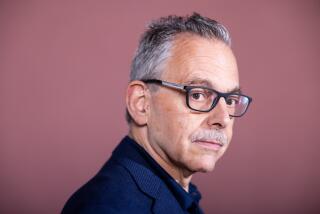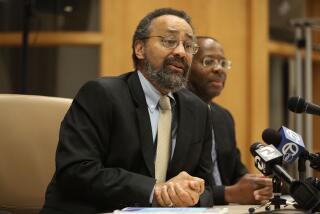UCI Professor’s Noble Peace Efforts Take Prize : Leadership: John M. Whiteley wins Extraordinarius award--the university’s highest honor--for life’s work.
- Share via
IRVINE — How to achieve lasting peace in the nuclear age has been an all-consuming quest for UC Irvine’s John M. Whiteley.
The 50-year-old psychology professor has devoted most of the last decade to building bridges with Soviet scientists and interviewing more than 120 of the world’s leading thinkers about war and peace, and what individuals can do to make a difference. The interviews became “Quest for Peace,” a PBS series that has been broadcast on 400 stations in 48 states.
He has also been a catalyst in winning nearly $1 million in endowments for three chairs in Global Peace and Conflict Studies, making UCI the only university in the nation to devote such attention to these issues. Because of him, an anonymous donor has given UCI $3 million in trust to promote education on reducing the nuclear threat. And negotiations to establish two more peace chairs are in progress.
Yet these are only a few of the reasons UCI’s Alumni Assn. has chosen the silver-haired Whiteley to receive its highest honor--the Extraordinarius award--at the university’s annual Lauds and Laurels ceremony tonight.
There is his work on the Global Common Classroom, a computer link between Soviet and Orange County students to sow the seeds of global understanding. He has helped develop a college preparatory program at the Sherman Indian High School in Riverside. He is also continuing a 16-year research project on the moral and ethical development of college students. And without his tenacious efforts, some say, there would not be a Bren Events Center on the UCI campus today.
“He is, in a word, extraordinary,” said longtime colleague Keith Nelson, a professor of history and director of the peace studies program, a network of more than 30 faculty in disciplines ranging from anthropology to electrical engineering to physics. “He is imaginative. He will think of ways of doing things that just no one else would think of.”
Psychobiology professor James McGaugh recalls the days a decade ago when he served as executive vice chancellor and Whiteley reported to him as dean of students and later as vice chancellor for student affairs.
By all accounts, Whiteley was something of a nag on the subject of a student center to host a variety of events from basketball to conferences. It was a time, however, when top UCI administrators had other priorities. So Whiteley set about organizing students and building ties with major community donors. Eventually, students passed a self-taxing measure to raise the bulk of the $13 million cost, and people like Irvine Co. chief Donald Bren kicked in the rest.
“He pushed relentlessly for it, let me say,” McGaugh said. “John Whiteley is motivated by values, and his values were that students needed to have a center. So he pushed at a time when that view wasn’t shared by everybody. . . . It has turned out to be quite a draw for the campus, so I guess I’d have to say he’s a visionary.”
Benefactor Elizabeth C. Tierney put it another way.
“We have nicknamed him ‘the Diesel’ because he’s just like a trusty diesel engine--he never gives up, he just keeps going,” said Tierney, who with her husband, Thomas T. Tierney, donated $300,000 to establish the first of the three peace chairs in 1987. “He marches to his own tune at his own pace. . . . He’s tenacious. He never gives up.”
Whiteley is mystified at being chosen to receive an award that has gone in past years to UCI founding fathers such as its first chancellor, the late Dan Aldrich, McGaugh and to benefactors such as philanthropist Arnold Beckman.
“His first words when we had a little informal party for him (were) ‘Oh, I really don’t deserve this,’ ” said Barbara Al-Bayati, who heads the research and development arm of UCI’s outreach to other schools and colleges.
“You have to know John,” said Al-Bayati, who nominated him for the award along with Lori Warmington, whose family endowed the third of UCI’s peace chairs. “He’s a very self-effacing person. He is very big on compassion and has this tremendous intellectual energy. . . . But I don’t think he has any perception of how really great he is.”
Whiteley, a graduate of Stanford and Harvard universities, came to UCI in 1972 as dean of students from Washington University in St. Louis.
In 1975, he and several colleagues embarked on a unique experiment known as the Sierra Project, in which a group of freshman entering the university’s School of Social Ecology were tracked to study their character development, especially how they develop moral and ethical values during their college years. Their curriculum was specially designed to expose them to issues of ethical judgment and sensitivity.
A third book is now in the works exploring how these students are doing as adults and how they make moral and ethical decisions in their daily lives.
As vice chancellor for student affairs from 1978 until 1983, Whiteley was credited with being a problem solver and someone who always pushed for issues and programs that would benefit students.
“I remember sometimes we would all be in a meeting and dealing with what some of us thought were crisis issues involving a student or group of students,” McGaugh said. “He was always the one to say, ‘I’ll be happy to take care of it if you want me to.’ Then he would take care of it. He would take on responsibility and serve the university, but without a lot of noise about it. . . . He’s a true citizen of the campus.”
In 1983, Whiteley immersed himself in his work in the social ecology department as well as becoming a founding faculty member of the Global Peace and Studies Program. His “Quest for Peace” series began the same year with renowned psychologist B. F. Skinner’s visit to UCI. When he heard Skinner’s pessimistic thoughts on the prospects for a more peaceful world, he began to explore the views of other leading psychologists, then scientists, politicians, diplomats, educators and arms control specialists.
At the same time, Whiteley launched other efforts with various collaborators to promote international understanding. The Global Common Classroom, which he saw as a chance for American and Soviet children to transcend political and geographic boundaries, was hatched over a bluefish dinner with longtime colleagues Monica Brasher of Washington and Robert Tinker of Cambridge, Mass.
With support from the National Geographic Society, an expanded computer-link program now includes children in China. And at a special conference Whiteley organized last week at UCI on the environmental consequences of nuclear development, he asked Chinese and Soviet scientists to help design experiments for a computer lesson on the weather in their respective countries.
How did a psychologist come to be so active in these issues of war and peace and creating a safer world?
“Well, I was a political science major as an undergraduate,” Whiteley explained. “So the thread in my life has been an interest in issues in the world. And part of being a psychologist is that I see that (wars) are problems that people create themselves. . . . It is inhumanity to one’s fellow humans.”
That passionate view about an individual’s responsibility to help prevent nuclear disaster, armed conflicts and destruction of the planet may well be what motivates people to open their checkbooks so willingly for him.
“John would never slap a back,” McGaugh explained. “Here’s a guy who speaks in a low voice, he moves slowly, he’s not rousing in his personal style. And yet he persuades people of the value of his views. People respond to that.”
Asked how he felt about the alumni award, Whiteley’s gaze remained steady, but his blue eyes teared slightly as he pondered the question.
“There’s this wonderful passage in ‘The Velveteen Rabbit’ about feeling real,” he said of the children’s classic in his usual measured Midwesterner’s monotone. “There are certain experiences you have that make you feel cared about. And clearly the recognition is wonderful.”
More to Read
Sign up for Essential California
The most important California stories and recommendations in your inbox every morning.
You may occasionally receive promotional content from the Los Angeles Times.













